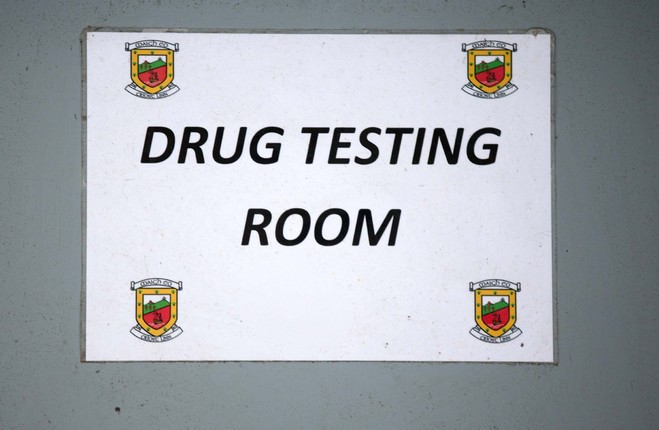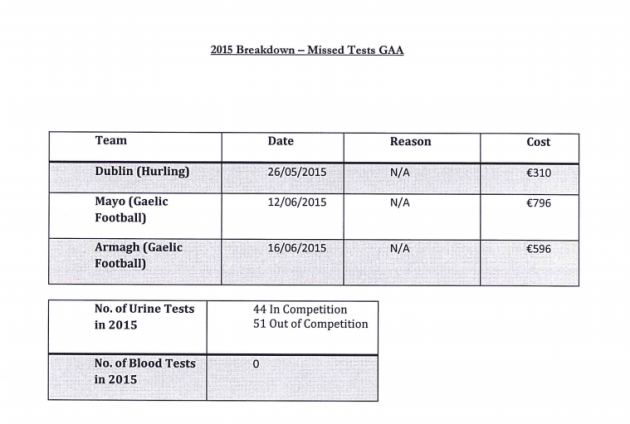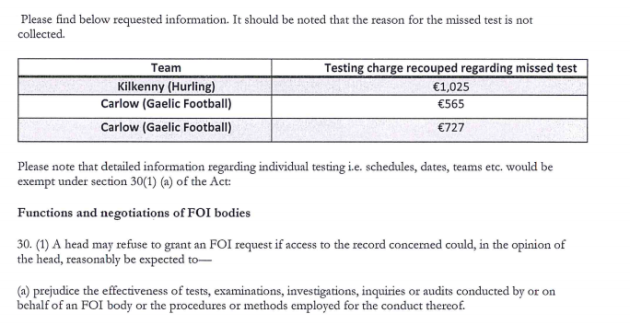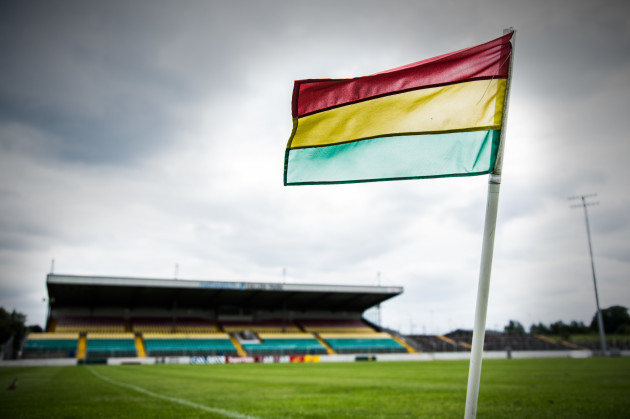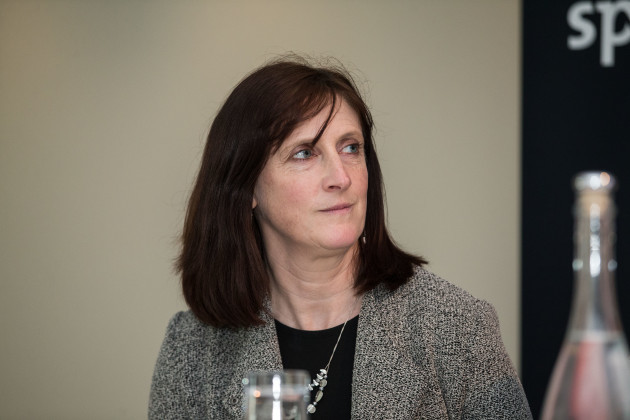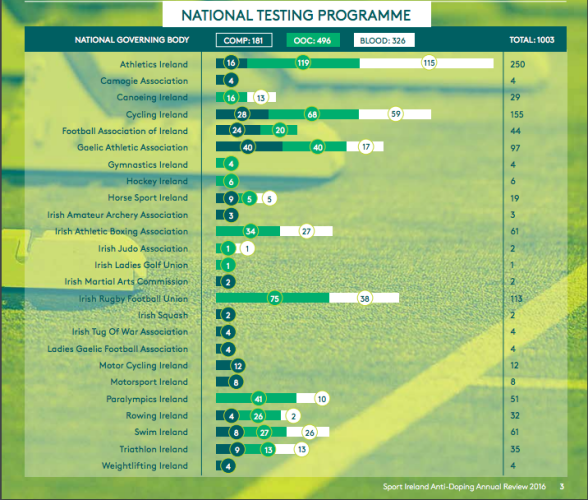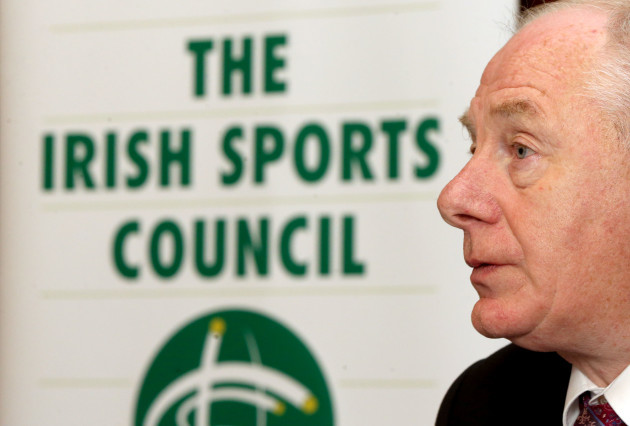THE KILKENNY HURLERS and Mayo footballers are among five inter-county GAA teams who were absent for mandatory drug tests in the past two years.
The footballers of Carlow and Armagh, along with the Dublin hurlers were also fined for missing drug tests since 2015.
Carlow were the only team to miss a test more than once - they missed two in 2016.
Documents obtained by The42 under the Freedom of Information Act revealed that five county boards were handed penalties totalling €4,019 over the last two years. The fines range from €310 in Dublin’s case in 2015, to the €1,025 Kilkenny paid last year.
Missed tests in 2015
Missed tests in 2016
Sport Ireland are responsible for administering the tests. The testers receive the fines directly as remuneration when a team fails to show. As part of the Government funding, GAA players are required to make themselves available for drug tests, both at training and after games, during the inter-county season.
County teams must keep Sport Ireland aware of the location of their training sessions, but missed tests are often down to a breakdown in communication between both parties.
Kilkenny, Carlow and Armagh all explained to The42 that a change in venue was the reason for their missed tests.
“Kilkenny GAA had been texting Sport Ireland with details of all training and match arrangements for our senior hurling team,” the Kilkenny county board said in a statement.
“It appears that a text message was not received resulting in a missed test because of a late change of venue in 2016. Since then Kilkenny GAA has now been both texting and emailing Sport Ireland with any alterations.”
The Carlow county board explained: “Last minute changes of training venue due to inclement weather led to miscommunication. Carlow GAA will not be commenting further on the matter.”
“In respect of the missed test in 2015 there was a simple communication issue,” said a statement from Armagh.
“Armagh senior training takes place at our Callanbridge facility and on the night in question heavy rain left the pitch unplayable.
“At the last minute training was switched to the Athletic Grounds, 300m from Callanbridge. Croke Park accepted Armagh’s explanation.”
Dublin and Mayo did not respond to a request for comment.
Sport Ireland’s director of anti-doping Dr Una May believes doping is not a major issue in the GAA.
“I don’t have a particular concern about doping in the GAA,” she said. “I believe there will always be missed tests because it’s the nature of testing. We’re unlikely to ever get a perfect solution where somebody will always tell us every time something changes in the training.
“We’re doing a reasonable amount of testing out-of-competition. That means by the law of averages we’re going to get missed tests. In the same way when do it with individuals, we will always get unsuccessful attempts.
“We don’t generally get significant repeat offenders, in which case you might have a concern. We don’t ask for an explanation, but we have a fair idea of what the explanations are because the testers will get to the venue and be told, ‘training was cancelled’ or ‘they’ve gone somewhere else.’
She continued: “Some teams have very fixed programmes but others chop and change quite a lot. We see that from their updates.
“We usually have a sense of what’s going on and we don’t have a concern. I don’t know of any situation where we felt they’re not there deliberately. The testers would contact us immediately if they felt there was something suspicious.”
Dr May refuses to accept the argument that inter-county players should not be subjected to testing as it is an amateur game.
“The amateur side of it is irrelevant in our view. Some of the rugby players are about the only people in this country who we’d consider to be professionals. The approach of GAA, the intensity, competitiveness and profile would make them very much on a par with any other athlete in the country.”
In their annual report released in March, Sport Ireland revealed that 97 inter-county players were tested in 2016, including 17 blood tests. Of the 80 urine tests that were conducted, 40 players were tested directly in-competition (after games) and 45 out-of-competition (at collective training sessions).
Blood testing was introduced into the GAA for the first time in 2016. By testing both blood and urine, Sport Ireland can detect a wider range of banned substances in the system.
“Blood testing is more useful to us in endurance type sports,” continued May. “There are certain substances we can measure in blood more effectively than in urine. Our programme will always include both.
“There might be times we go into a team and only do blood or urine, but on the whole both types of sample provide slightly different information. But blood won’t ever replace urine.”
Former Monaghan panellist Thomas Connolly was the first GAA player to be banned for failing a test in 2015. Connolly tested positive for a steroid and was subsequently banned for the standard two years.
According to Dr May, the standard ban for a positive test has since been doubled. It means that if a player were to fail a test in 2017, they would be automatically suspended for four years.
“The new World Anti-Doping Code means the standard ban is now four years. There are ways in which an athlete can get that ban reduced, there are a lot of very complex reasons and ways they can get their sanction reduced, but the starting point is now four years.”
In contrast to their male counterparts, just four camogie players and four Ladies footballers were tested last year.
Dr May explained: “No disrespect whatsoever to the players, it’s more down to the profile and things that would create a risk. There’s a much higher risk in the male side of the sport because it’s a very high-profile sport and participants would be very high-profile.
“In camogie and Ladies football, there’s a lot less competition, competitors and profile.”
Gaelic Players Association player development and marketing manager Siobhan Earley said that while five inter-county players presented themselves to the players body’s counselling service with alcohol issues in 2016, none sought help for a recreational drug problem.
“For high performing athletes, it is harder to abuse alcohol or recreational drugs as there is a negative physical side effect which will be spotted quite quickly,” said Earley.
The42 is on Instagram! Tap the button below on your phone to follow us!
